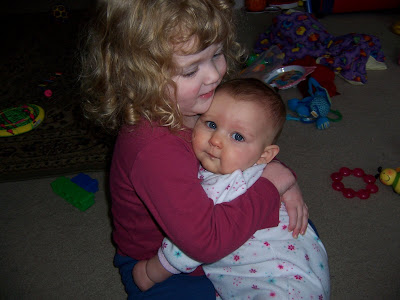There are times when I wonder how my two daughters can possibly be related. They do have some similar features, but while Cordelia is pale, blonde and curly-headed, Miranda is olive-skinned, brunette, and so far has straight hair. While Cordy always respected boundaries as a baby, Mira is the jailbreaker. Cordy was an early talker, and late walker. Mira is an early walker, and not interested in talking much. The slightest hint of my disapproval would send Cordy into tears, but Mira laughs at my attempts to correct her. Two girls could not be more different.
And then there are times when I see a hint of baby Cordy in Mira. Like today.
Cordy, 2005 – 13 months old
Mira, 2008 (this morning) – 11 months old


This is what they both choose to do when I walk out of the room for two minutes.
They’re clearly sisters.





